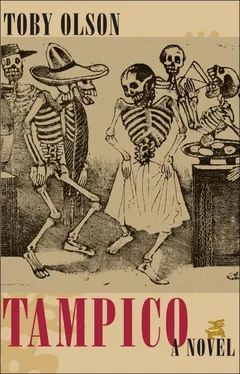“If only there were decent relatives,” Frank said.
“Why?” Gino said. “It could be the same as this, just different furniture.”
“I have a son,” said Frank. “That could be even worse.”
They heard the sound of sucking from the ward, and Gino looked at each of them, then turned back to the window.
“Maybe I could go to Tampico once again.”
It was John. He held his cigarette in the air, poised there, and there was something in his tone that got to each of them, both fantasy and possibility in the words. Then Gino coughed and lit his pipe again, and they could see the smoke rise, puffs disintegrating into a wispy haze above his shoulders at the window.
He turned then and began talking, picking the words carefully out of memory, telling the story in a formal way, as if he had no care or part in it, as if it were someone else’s life in the balance there, for he had come through it all and was here now for the telling and was only the messenger of his past. John adjusted his wheelchair and faced him and tapped a cigarette on his can, then lit it, the smoke flooding from his tracheotomy tube, and settled in with the two others to listen.
“… and Ramona was born in the tenth year of our marriage, my wife desperate for her in the lost romance of her own childhood, that she would join a company of virginal lovers and study her posture standing in the doorway, makeup and fine clothing, candlelight and flowers. But it was always Gino coming, the little guy in work clothes, and with the birth of a daughter the romance changed for her — image of the perfect mother, sister and confidant — so when Ramona pinned her tongue with the fake diamond she was accepting of it in bewilderment, and when she brought the tattooed boys around, ominous but manipulated, it was no last straw for her, though it was for me.”
High school, 1950, held back a year for truancy, his wife was giving her secret money, she was nineteen and hysterically theatrical, and he was already sixty, the ancient dull-witted father, but his wife was only a child for her, and Ramona was no fool about that until she was.
Sitting in the living room in the suburbs, wanting money, that dark boy in his mid-twenties on the couch beside her, carefully groomed, but dirt at the cuticles of his pared nails and in the wings of the hair he’d greased and combed, a thick hanging chain, and the black ironed shirt he wore, those stains at the pockets’ edges, and those tattoos.
When I get a proper life! When I get some decent clothes! Spark of the diamond on her tongue flicking in the red wound. When I get out of this shit hole!
Why not now? he’d said. And that stopped her, and the diamond disappeared behind her teeth, and she dragged the useful boy up out of the couch and slammed the door behind them as they left.
“We thought it was temporary of course. My wife died in 1962. She was just fifty-nine, my child bride. Have I mentioned her name yet? It was Mona. And in the days of the twelve years of her daughter’s absence she was getting ready to die, though I don’t think she knew that. It was a cervical malformation that caused the stroke, and I think it came from her hanging head, lifted only when she looked through the window, as if the physical gesture of anticipation could produce the desired object, Ramona on the sidewalk, coming home. I was retired then and seventy-one, and I thought I might be dying too, for I was some malignancy in the household, reminder in my presence of the cause of our daughter’s leaving, and it was true that I never loved Ramona, felt her absence only as relief, and I think my wife saw this, and I walked the suburban streets and read books in the evenings, and we both waited for something, but not the same thing. Ramona was a late child for us, and the only one. No excuse of course for her failed parents. But I think she held a pathology that we didn’t bring to her, though I accept responsibility for a certain coldness.
“But I didn’t die, and Mona did, and then I made my one pathetic move. I bought an isolated house near Cairo, on thirty acres, and set myself to gardening and fussing with repairs, and waited absently for death.
“I said I traveled to Tampico once, but that wasn’t true. It was only conversation in this place, part of our useless joking and badgering, and that’s why I’m leaving. I never traveled, or took pleasure in places or people, nor did I have the warmth of a woman in my bed beyond my early fifties. I worked and had a wife and daughter, and then the one left and I retired and the other died, and that was my life. I walked the streets like a man whose days were over, when they were only half over, and then I set myself to mindless tasks, and when I wasn’t mindlessly doing them I sat at a kitchen window smoking a special blend, gazing out vacantly at the possibilities of life there, with no heart for them at all.”
He does look like Harry Truman, John thought. They’d be of a similar age had Truman lived, and those pixie ears would have thinned by now to the same parchment. He wondered if Truman had such small hands, had lifted them to touch his brow and nose with the same vacancy. Gino’s robe had fallen open at his chest, and moonlight washed over his ribs, and his dark nipples in that variegated bony field were gemlike, black pearls in mottled alabaster, and John thought of the men he’d seen at the roadside near La Loma, traveling up to Matamoros with Chepa, so many years ago. They were baking, shirtless, in the sun, sitting at the ditch they’d been digging, drinking water that ran in rivers down their dark leathery chests as they lifted glass jars, and there was one to the side, and when he saw them passing he lowered his jar and looked at them, and quite suddenly it was he who was the subject, and they were only the world passing for his interest, and John had imagined he had been there before anything had. He would have thought, before the start of all living human commerce, but he was too young for such thinking.
Now he saw the same thing in Gino, but only as a similarity of knowledge in his blue eyes. The gestures that surrounded them were searching in the story for his body in its age, and he was getting there, but it was a long and difficult journey because he was a hundred years old.
The moon was bright in the windows above the radiator, and Larry still held the cards. John had reached up to the IV pole and turned off the light, and Larry could hear his breathing in his nose and the faint whistle in the suck of the cigarette in his tracheotomy tube. Frank leaned back in his chair across the room. He was watching Larry’s hair fall, but absently, giving himself up to the story now and the lesson of its apocalypse.
“And could this time be only moratorium, hospitals and rest homes, a delay of grafts, and medication and months in metal tubs and debridement turning into eighteen years, and certain moments of potential passing by in bewilderment, and then this cancer really only an excuse?
“I was eighty-two years old, and she came in a camper and with two others, and the camper’s wheels guttered in the gravel drive and sprayed stones, and the other two climbed out. They were like her boys in the past, but older and foreign in some way, but they never spoke and I got no sense of their origins. They wore jeans and light leather jackets, and one had a ponytail tied up in a greasy knot, and the van’s panels were painted with vague images of adorned skeletons and women in white robes attending them in swirls of mist and sun rays. Then Ramona climbed down to the gravel and came up to the porch where I was sitting and stood in the stones and looked up at me.
“It was money, but at first it was the mechanics of greeting, the empty awe of the years. She came up on the porch in her tooled boots and sat down in the wicker chair, and I told her her mother was dead, but she seemed to know that, and I had nothing else to tell her, so I told her the details of my moving and living there. But that was over in moments and the force of the vacancy of my life came down on me, and I asked her about her years, but there was little that she could find to say. She mentioned places I’d never been — Las Vegas, New Orleans and the Gulf Coast, Mexico. I said, ‘But you’re forty now.’ ‘Not quite ,’ she said.
Читать дальше












